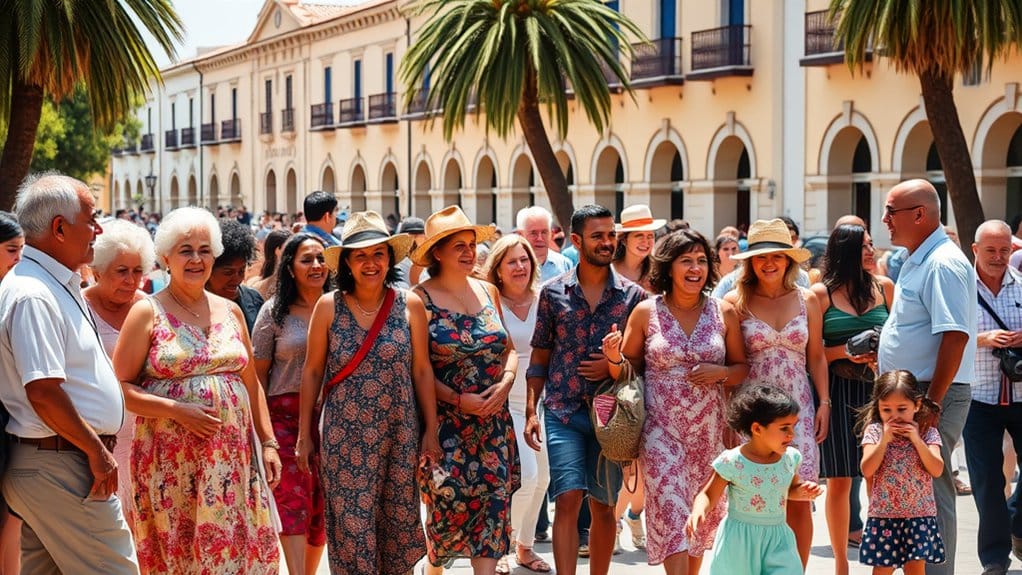Uruguayan men and women exhibit unique characteristics, blending tradition with progress, valuing community, family, and social justice, with a growing shift towards equality and shared responsibilities, leaving one to wonder what specific traits define them.
Key Takeaways
- Uruguayan men value family and social life.
- Women manage domestic duties, seeking gender equality.
- Men typically hold authority in families.
- Both sexes prioritize education and individualism.
- Traditional gender roles influence relationships.
Demographic Characteristics

As the discussion turns to demographic characteristics, it becomes evident that Uruguay’s population density, which stands at 19 individuals per Km2, or 50 individuals per mi2, as of 2024, is a critical factor, with metropolitan Montevideo hosting about 1.9 million residents. Urban dynamics play a significant role, with Montevideo having the highest population, and Flores having one of the lowest. Ethnic diversity is also notable, with a dominant European descent population, and smaller black, indigenous, and East Asian groups. This mix influences urban dynamics, contributing to the country’s unique demographic characteristics, shaped by its urban dynamics and ethnic diversity. The country’s total area of approximately 176,215 square kilometers supports a wide range of geographical features that impact settlement patterns and population distribution.
Educational Background
Uruguay’s educational system, despite its free and compulsory nature for children aged 6 to 14, faces significant challenges in ensuring that its citizens complete their education, particularly beyond the mandatory period. The country boasts high literacy rates, at 98.6 percent, contributing to notable educational achievements. However, less than one-third of Uruguayans complete secondary school, hindering overall educational progress. Targeted programs aim to improve these outcomes, fostering a more educated population, and thus, promoting autonomy through knowledge, which is essential for personal growth, and socio-economic development, ultimately leading to a more liberated society. The education system has a very low student-teacher ratio, which allows for a more personalized learning experience and has been linked to greater student success.
Career Aspirations

The labor market in Uruguay presents a intricate scenery, with employment rates hovering around 59.80 percent, and a labor force participation rate of 64.60 percent, as of December 2024. Career expectations, job satisfaction are impacted.
The latest data shows that the employment rates have been steady, affecting the overall outlook on career development and growth in the country.
| Category | Rate |
|---|---|
| Employment | 59.80% |
| Labor Force | 64.60% |
| Unemployment | 7.40% |
Uruguay’s career aspirations are shaped by these rates, influencing job satisfaction, with a focus on freedom, and better career opportunities.
Family Values
Family values in Uruguay are undergoing significant changes, driven by shifting societal norms, economic pressures, and evolving gender roles, which have led to a pronounced impact on family structure and dynamics. Parental involvement is increasing, with men taking on more domestic responsibilities, contributing to family resilience. This shift is essential, as family stability plays a central role in child well-being, with children from two-parent families generally having better outcomes. As a result, Uruguayan families are adapting, with a growing trend towards more equitable distribution of household work, and a greater emphasis on cooperation, and mutual support, fostering stronger family bonds. The changes in family dynamics are also reflected in the increase of civil marriages, which has been a significant factor in the transformation of family values in Uruguay.
Social Expectations

Uruguayan society still assigns distinct roles to men and women, with family roles often influenced by traditional gender differences, resulting in women shouldering more domestic responsibilities, and men generally holding more authority. The persistence of these stereotypes is evident in various aspects of life, including the workplace, public life, and domestic spheres, where women face significant challenges, such as pay disparities, limited participation in government, and prevalent domestic violence. As a result, addressing these social expectations, particularly the entrenched notions of family roles and gender differences, is vital to promoting equality and fostering a more inclusive environment for both men and women in Uruguay. The country has made significant progress in recent years, with the introduction of reproductive rights playing a crucial role in empowering women and promoting gender equality.
Family Roles
As societal norms continue to evolve, women’s roles in Uruguay are expanding, with motherhood no longer being the sole defining aspect of their lives, although traditional expectations still linger, with 54% of the population believing a woman must be a mother to feel fulfilled, and many women taking on the “double shift” of work inside and outside the home, which can be both enabling and exhausting. This shift affects family dynamics, influenced by changing gender expectations, leading to a reevaluation of responsibilities within households, and ultimately, a change of Uruguayan family roles. In a typical Uruguayan household, such as the one led by Orlando and Raquel, the homemaker role is often filled by the mother, who manages the home and takes care of the children, while also sharing some responsibilities with the older children like Dahiana.
Gender Differences
Many societal norms in Uruguay still perpetuate significant gender differences, with traditional expectations of men and women influencing various aspects of life, from educational choices to workforce participation, shaping the country’s social and cultural setting. Gender perceptions and societal norms dictate women’s and men’s roles, limiting opportunities for women in male-dominated fields. Women face substantial obstacles in achieving economic equality, despite high educational attainment. Concerted efforts are needed to address these disparities, implement inclusive policies, and challenge stereotypes, promoting freedom from restrictive gender perceptions and outdated societal norms, ultimately fostering a more equal society. The lack of progress in addressing these issues is evident in the country’s abortion laws, which reflect deep-rooted societal attitudes towards women’s rights and continue to hinder gender equality.
Cultural Influences
While the country’s unique cultural scenery is often overlooked, its rich heritage is, in fact, a intricate blend of diverse influences, forged through centuries of colonization, immigration, and globalization, which have all left an indelible mark on the nation’s identity. Uruguayan culture is characterized by a cultural fusion, combining indigenous heritage, notably from the Charrúa community, with European traditions. This blend is evident in customs, place names, and a growing movement to reclaim Indigenous identity. The result is a distinct cultural scenery, shaped by history, and defined by a strong sense of freedom and cultural expression. The cultural impact of European immigration is also notable, with Italian influences visible in the nation’s culinary traditions and architectural styles, further enriching the Uruguayan cultural landscape.
Lifestyle Preferences

What constitutes a fulfilling lifestyle for Uruguayan men and women is largely defined by their emphasis on social life, leisure activities, and work-life balance, which distinctly sets them apart from other cultures. They value social gatherings, leisure activities, and freedom. The quality of life in Uruguay, with its tranquilo lifestyle, also plays a significant role in shaping the preferences and priorities of its people.
| Lifestyle | Preferences | Activities |
|---|---|---|
| Social | Family time | social gatherings |
| Leisure | Outdoor activities | biking, beaches |
| Work-Life | Flexibility | free time, personal |
| Practical | Affordable | real estate, healthcare |
Personal Traits
Uruguayan men and women exhibit distinct general traits, including a strong sense of social justice, progressive attitudes, and a deep connection to their cultural heritage, which shapes their interactions and worldview. Their social skills are characterized by a warm, welcoming, and direct approach to communication, often accompanied by physical gestures like hugs and kisses on the cheek, reflecting a culture that values trust and closeness. As they maneuver through their personal and professional lives, these traits, including their emphasis on education, individualism, and resilience, play a significant role in shaping their relationships, decision-making processes, and overall outlook on life, making them a unique and fascinating population to study. The traditional Uruguayan drink, yerba mate, is also an integral part of social gatherings and daily life, symbolizing friendship and community bonding.
General Traits
Personal traits of Uruguayan men and women are shaped by a unique blend of cultural heritage, social values, and historical influences, resulting in a distinct character that is both pragmatic and progressive, with a strong emphasis on education, social justice, and individualism. They value social justice, striving for equality, and individualism, embracing freedom. Their beliefs are rooted in a strong sense of community, progressive attitudes, and a deep connection to their land and heritage. This combination fosters a population that is politically conscious, socially aware, and determined to maintain their independence and freedom, with education being a key factor. The high literacy rate in the country also contributes to the population’s overall progressive and open-minded nature.
Social Skills
Social skills, a key aspect of personal traits, are influenced by the intricate interplay of education, socio-economic factors, and community dynamics, which, in turn, affect the development of Uruguayan men and women. They face challenges in social interaction, hindered by low socio-emotional skills, and emotional intelligence is a major concern. Education disparities, bullying, and limited support for well-being impact their development. Despite this, they value family, education, and community, essential for building social skills. Effective policies, inter-ministerial coordination, and individual efforts are necessary to improve social interaction, emotional intelligence, and overall well-being, ultimately enhancing their social skills. The development of socio-emotional skills requires attention alongside cognitive skills, and this balance is crucial for the growth of Uruguayan men and women.



